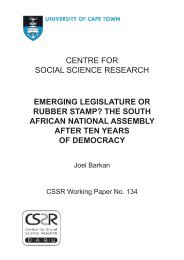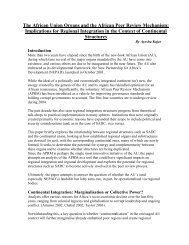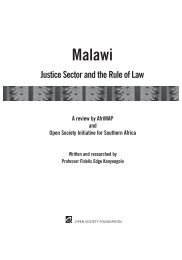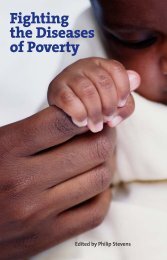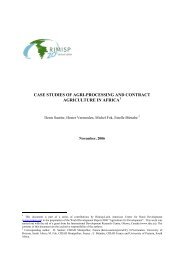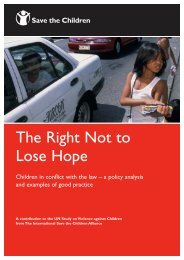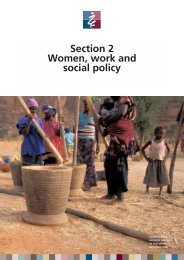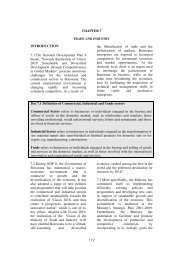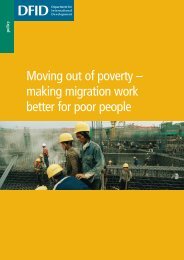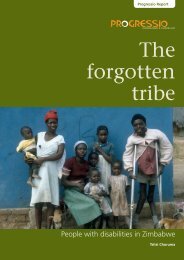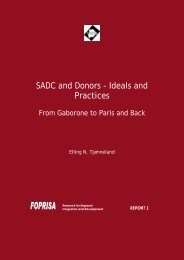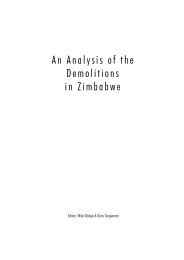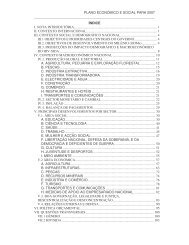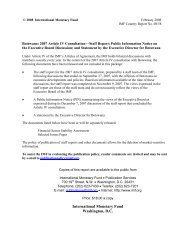Report of the National Conference: Women's Property Rights ... - FAO
Report of the National Conference: Women's Property Rights ... - FAO
Report of the National Conference: Women's Property Rights ... - FAO
You also want an ePaper? Increase the reach of your titles
YUMPU automatically turns print PDFs into web optimized ePapers that Google loves.
Ntengwe Community Development in Zimbabwe has sensitisation and educationprogrammes directed at abusers and children. Community mobilisation <strong>of</strong> this nature issustainable as <strong>the</strong> community owns <strong>the</strong> programme.There is a lot <strong>of</strong> good work being done by organisations in Zambia but <strong>the</strong>re is a clearlack <strong>of</strong> information flow and awareness <strong>of</strong> what organisations were doing. There is aneed for more networking between different players including <strong>the</strong> legal system, police,NGOs and government if <strong>the</strong> problems <strong>of</strong> widows and orphans are to be addressed.6.5 HIV and AIDS and women’s property rights and livelihoods in Nor<strong>the</strong>rnProvince Rachel Msikita, <strong>FAO</strong> ConsultantThis paper gives an overview <strong>of</strong> a descriptive study done in four districts that coveredeight communities in Nor<strong>the</strong>rn Province. The study done in 2004 concentrated on Mpika,Isoka, Mungwi and Chilubi districts. The study uses <strong>the</strong> asset framework analysis foridentifying HIV and AIDS impacts on households. The household assets are describedunder five categories <strong>of</strong> human capital, social capital, financial capital, natural capital andphysical capital.The major impacts <strong>of</strong> HIV and AIDS on human capital include a loss <strong>of</strong> adult labour andknowledge, an increase in number <strong>of</strong> orphans with an average <strong>of</strong> 3.56 orphans perhouseholds being recorded among female headed households who are living with AIDS.The elderly households were having more orphans and a case <strong>of</strong> one lady who was 70years in Mpika Finkulu community looking after 6 orphans with <strong>the</strong> eldest less than 12years old is given.It was observed that women generally own less land than male-headed households and itwas difficult for women to access <strong>the</strong> forest. The major constraint was limited capacity toutilise <strong>the</strong> forest due to lack <strong>of</strong> labour and financial resources to hire labour.Female-headed households experienced more property grabbing than male-headedhouseholds and yet households did not seek any legal action due to ignorance about suchlaws and also fear <strong>of</strong> witchcraft. A quote is taken from a woman in Mugwi who has beenvictimised using a witchcraft scare:“When my husband passed away, his relatives took away everything. I tried to seekassistance through <strong>the</strong> headman and he tried to talk to <strong>the</strong> relatives but nothingchanged. I was advised to see <strong>the</strong> Legal Services Foundation but <strong>the</strong> threat <strong>of</strong>witchcraft came in. Because I was afraid I withdrew <strong>the</strong> case. I am now strugglingto make ends meet through gardening and beer brewing but before my husband’sdeath we had fishing equipment which enabled us to survive”According to <strong>the</strong> study, some livelihood activities undertaken by households that aremeant to provide resilience end up exposing <strong>the</strong>m to even greater vulnerability. Forexample beer brewing is a quick way <strong>of</strong> getting money for paying for medical bills17



